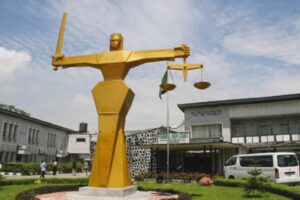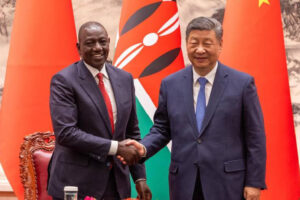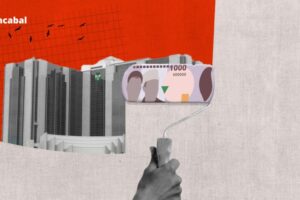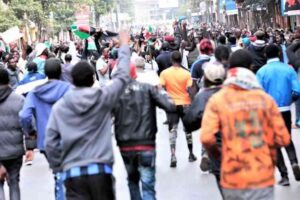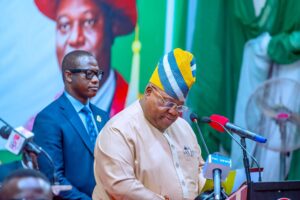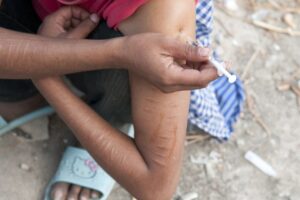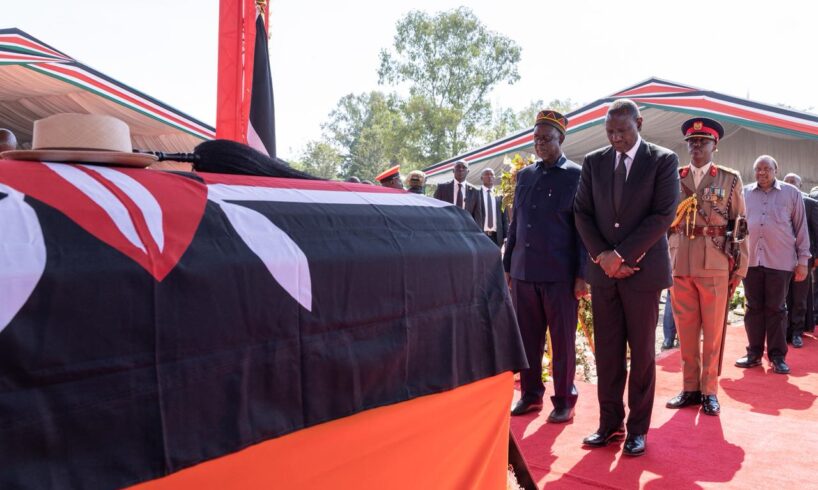
BONDO, Siaya County Oct 19 — Dr Oburu Oginga, elder brother of the late former Prime Minister Raila Odinga, delivered a deeply personal tribute, calling Raila “my best friend in life” and recalling a childhood and public career marked by defiance, brilliance and courage.
“I have lost my best friend in life. I will never have another friend like Raila,” Oburu said. “I am standing here not knowing what to say because my best friend is gone.”
He painted intimate scenes from their boyhood in Bondo and Kisumu. “One time [our father Jaramogi] asked why Raila was not picking cotton, and Raila told him, ‘You know it is very difficult to pick cotton—why don’t you also try?’ He was disciplined a little,” Oburu recalled, presenting it as an early sign of a child who would not be “misused”. Defiance followed him into the classroom, too: “A teacher was disciplining us and expected us to salute him after a beating—Raila refused to salute, and when he was beaten again, he still refused. He told the teacher, ‘You are caning me yet my mother had given me permission to be away from school.’”
Oburu remembered Raila as “always number one in class,” athletic and a “great lover of football—his team was Arsenal,” adding that early football knocks left marks on his brother’s face. “We were playing here in Kisumu when he was injured and I had to carry him. He got another injury later in Germany when he fell.”
Turning to the struggles that defined Raila’s public life, Oburu recalled visiting him at Kamiti Prison after the 1982 coup crackdown. “He was in a black death-row uniform. I cried and cried, but Raila was confident and brave. He told me, ‘Don’t worry—this will pass.’” He added: “Raila never feared even bullets or teargas. He would always face it.”
His final week: from repatriation to Bondo
Raila died earlier this week in India. His remains were repatriated to Nairobi on Thursday, arriving at Jomo Kenyatta International Airport aboard a Kenya Airways flight designated RAO001 in his honour. A huge turnout at Moi International Sports Centre, Kasarani, later turned chaotic; four people were fatally shot amid a surge and clashes around restricted areas, officials said.
On Friday, a State funeral service was held at Nyayo Stadium. As mourners pressed towards viewing points near Gate Five afterwards, a stampede left two people dead and 163 injured, with emergency teams treating the wounded and referring dozens to hospital.
On Saturday, the body was airlifted to Kisumu and taken to Jomo Kenyatta International Stadium (Mamboleo) for public viewing that ended at 3:00 pm, before the cortege proceeded by road to the Opoda home in Bondo for an overnight stay. A State burial is scheduled for Sunday in Bondo, with thousands—among them local and international dignitaries—expected to attend.
A brief history
Raila Amollo Odinga, son of Kenya’s first Vice-President Jaramogi Oginga Odinga, trained as a mechanical engineer and rose to become the country’s most recognisable opposition figure over five decades. Detained without trial during the 1980s for pro-reform activism, he helped galvanise the second liberation and later served as Prime Minister (2008–2013) in the Grand Coalition Government. As leader of the Orange Democratic Movement (ODM), he championed devolution, electoral justice and constitutional reform, and built a national following rare in Kenyan politics.
Oburu’s eulogy threaded that public legend with the private man—principled from childhood, unafraid to question authority, and steady under pressure. “Raila was a brilliant man,” he said. “I will never have another friend like Raila.”
